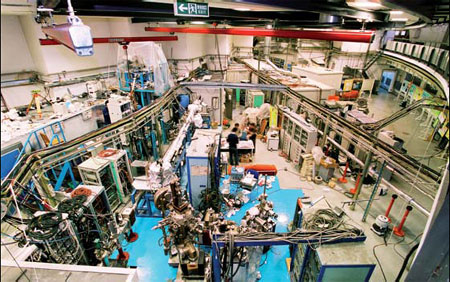Framework for the future
Updated: 2013-03-29 08:32
By Cheng Yingqi (China Daily)
|
|||||||||||
|
Scientists test devices at the Beijing Synchrotron Radiation Facility, part of the Beijing Electron Positron Collider project, at the Institute of High Energy Physics in Beijing. Provided to China Daily |
EU banks on Horizon 2020 to further scientific research links with China
The European Union will use its new financial instrument - Horizon 2020 - to further cooperation with China in research-related fields, says Philippe Vialatte, science counsellor of the Delegation of the European Union to China and Mongolia.
Vialatte says that his team is currently in talks with the Chinese Academy of Sciences to explore further areas of cooperation between the EU and China. CAS, China's leading academic institution, has 104 institutes spread over several disciplines and more than 60,683 employees.
Horizon 2020 is the EU's financial instrument that will run from 2014 to 2020 with an 80-billion-euro ($102 billion) budget, and is part of the bloc's drive to create new growth and jobs.
"We are keen on finding ways to increase cooperation (with China and CAS), because it is of very high quality in terms of science, and is of high quality in terms of developing the relationship between Chinese and European researchers. In other words, it is tantamount to the interests of both China and Europe to find a way to further strengthen this cooperation," Vialatte says.
According to Vialatte, new instruments to develop China-EU collaboration, especially in science and innovation, will be created under the aegis of Horizon 2020.
"Overall I anticipate great prospects from this alliance," Vialatte says. "We also expect to team up with CAS on infrastructure-related areas soon."
Research cooperation between China and the EU dates back to 1998, when a bilateral agreement was signed between the two sides in Brussels.
Through years of development, Chinese scientists' role has changed gradually in the alliance, says Tan Tieniu, CAS deputy secretary-general.
"The international cooperation of the CAS has gone through several stages," Tan says. "In the initial stages, we simply learned from the West. Then we had some mutually beneficial cooperation in selected areas with our European partners. Now we have extensive international linkages and partnerships, covering several disciplines."
Until Horizon 2020, most of the EU's research alliances were conducted through the Framework Programme for Research. The EU's Seventh Framework Programme for Research (FP7), which lasts from 2007 till this year, has the largest ever package with a budget of 10.8 billion euros.
The participation of the CAS has increased from 72 projects in the fifth FP (1998-2002) to 209 projects in the sixth (2002-06), and currently to 233 projects, making China one of the largest non-EU participants in the FP projects.
Today's Top News
List of approved GM food clarified
ID checks for express deliveries in Guangdong
Govt to expand elderly care
University asks freshmen to sign suicide disclaimer
Tibet gears up for new climbing season
Media asked to promote Sino-Indian ties
Shots fired at Washington Navy Yard
Minimum growth rate set at 7%
Hot Topics
Lunar probe , China growth forecasts, Emission rules get tougher, China seen through 'colored lens', International board,
Editor's Picks

|

|

|

|

|

|






